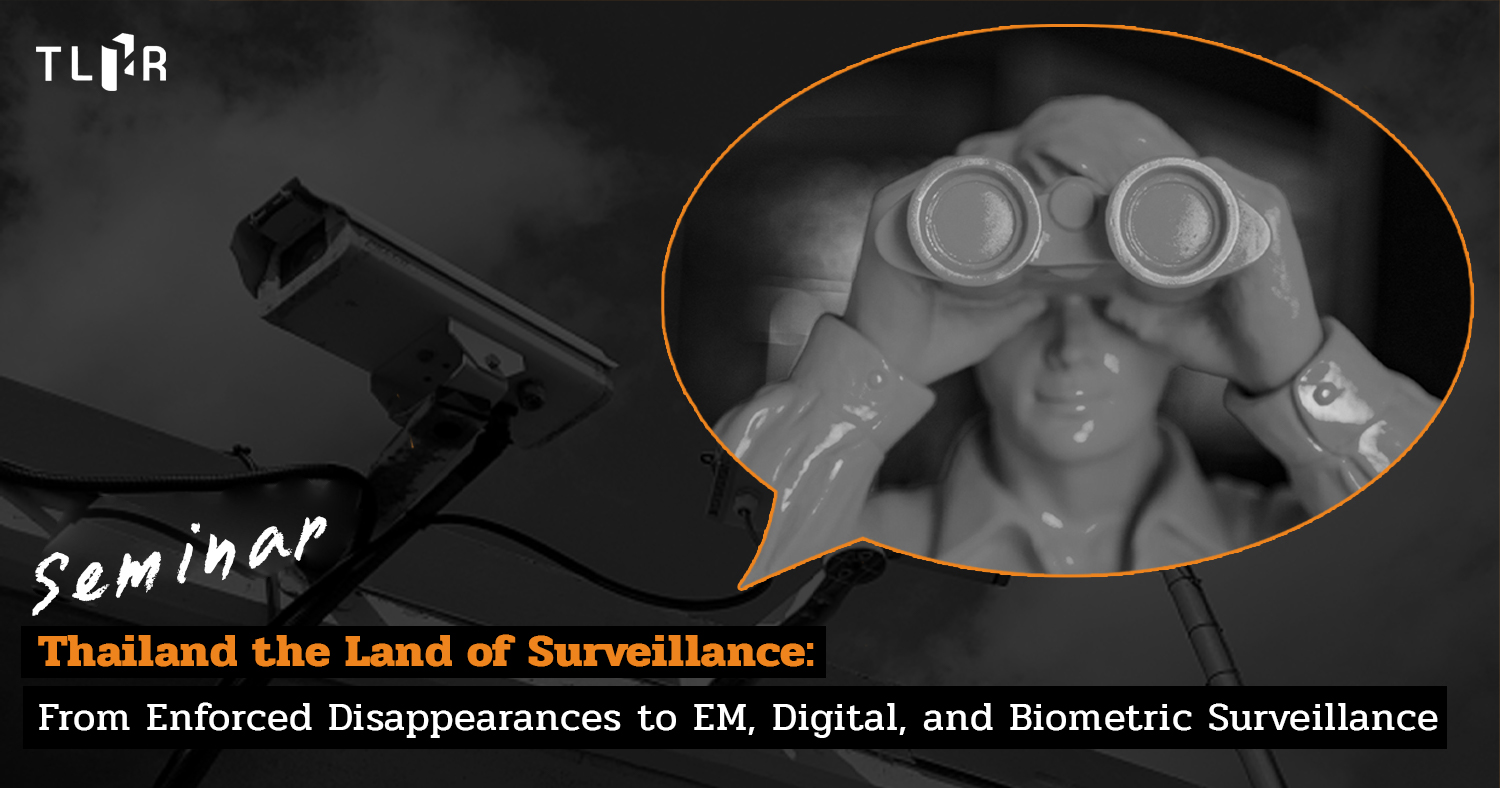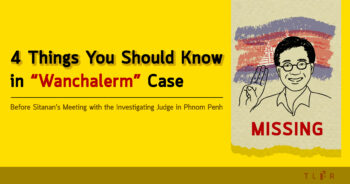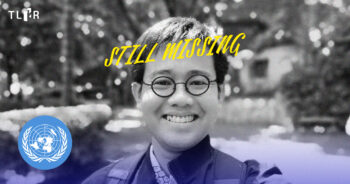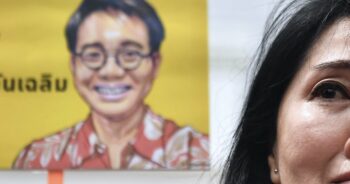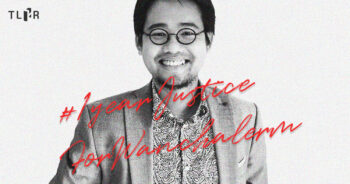On 6 June 2022, Cross Cultural Foundation (CrCF) organized the seminar “Thailand the Land of Surveillance: From Enforced Disappearances to EM, Digital, and Biometric Surveillance” at the Foreign Correspondents’ Club of Thailand (FCCT). The seminar uncovered the patterns and practices of the Thai state as they are used against activists, to illustrate the various intimidation tactics– such as calling individuals’ family members– which could be warning signs of a forced disappearance.
The seminar was divided into two sessions. The first half of the session consisted of exchanges on the patterns and practices of state surveillance and intimidation tactics employed by the state. The second half of the session involved discussion on different ways for activists to lower this risk and protect themselves from these practices. Moderated by Panu Wongcha-um, the main speakers included: Sitanan Satsaksit, Montana Duangprapa, Jaturon Iaemsopha, Pornpen Khongkachonkiet, Chonticha Jangrew, Yingcheap Atchanont, Phimchanok Jaihong, Sanhawan Srisod, Thitirath Thipsamritkul.
Thai Lawyers for Human Rights has compiled the main contents from the seminar, starting with the discussion of the two years anniversary of Wanchalearm Satsaksit’s disappearance on 4 June 2020. Then to the patterns and practices of state surveillance and intimidation through the experience of each speaker. And end with the different ways to lower risk and protect ourselves from the intimidation by the state.

Two years anniversary of the disappearance of Wanchaloem Satsaksit on June 4th 2020
Sitanan Satsaksit (Wanchalearm’s sister): The seminar with Sitanan’s speech on the two year anniversary of Wanchalearm’s disappearance. In the past two years, she has been sued twice: once for protesting at Asok junction, and the other time for submitting a letter of formal request at the U.N. building on Human Rights Day.
“It is very odd. I just want to let it be known that the state has abused its power to threaten and press charges upon the victim’s family, instead of using its abundant resources to search for the victim. This is far from over. I was also included on the red watchlist as a person of interest which is frightening for me. Why has the state done this to the victim’s family?”
Montanaa Duangprapa from Thai Lawyers for Human Rights (TLHR) gave an update on recent developments of the case with the use of four numbers. These four numbers– ‘2 6 3 2’ – represent the efforts by the Wanchalearm family to have the story of his disappearance be known nationally and internationally.
Number 2 – Two years since Wanchaloen has disappeared: from 4 June 2020 to 4 June 2022.
Number 6 – Six organizations in Thailand were contacted to make progress on the case. First was the Ministry of Foreign Affairs, and second was the Supreme court. These two were contacted to make a case of extraterritorial jurisdiction, because Wanchalearm is a Thai citizen. The third was the Ministry of Justice. went there to send a request for the formation of a committee on forced disappearance in Thailand. Fourth was the Department of Special Investigation or DSI, to request that this case be a ‘special case’. Fifth was the National Human Rights Commission. The final contact was the Committee on Legal Affairs, Justice, and Human Rights at the parliament. They coordinated the efforts of the previously mentioned organizations and notified us of developments on the case.
Number 3 – Three organizations in Cambodia were also contacted: the Ministry of Interior, Ministry of Justice, and the Phnom Penh district court which is the court of first instance.
Number 2 – Lastly, two U.N. bodies were contacted: the Committee on Enforced Disappearances, and the Working Group on Enforced or Involuntary Disappearances.
Montana gave an update from the Cambodian side. The Cambodian court of first instance inquiry judge is still conducting the investigation. Sitanan went to Cambodia to give information to the court on 8 December 2020. The Cambodian court went to examine CCTV records a year later but could not find the footage, as it was expired.
Moreover, the witness– a security guard– could not provide information on the culprit. The court is currently investigating the license plate of the abduction vehicle. The summary of the investigation is still pending.
The whole ordeal has raised a question: Why did the court not submit an opinion recommending prosecution after Sitanan appeared in court to present information a year earlier? It had to be sent to the attorney, who then sent it to the court once again, to start the legal procedure. Was this what caused the delay in the legal process? In turn, the evidence telling society about her brother’s disappearance was slowly fading away (the CCTV records).
Concerning updates from the Thai side, the DSI replied to the request to accept the case on 1 March this year, but did not yet specify it as a ‘special case’. They also requested information consisting of 172 pages of documents that Sitanan presented to the Cambodian court, and coordination with various organizations both national and international in order to obtain information.
Finally, the attorney-general notified us that he had contacted the Thai consul in Cambodia which received a reply from the Cambodian court. The court said that the case is still on further investigation by the court of first instance. That information is still confidential.

Patterns and practices of state surveillance and intimidation:
Changes, evolution, history, and case studies
From the three Southern border provinces, to the capital and the rest of the nation
Jaturon Iaemsopha is a descendant of “Haji Sulong Tohmeena”, who was the first victim of forced disappearance by the state in 1954. This first case of forced disappearance in Thai history was from the three Southern border provinces. The victims were: Haji Sulong Tohmeena, his eldest son, and his two students. This could be the only case in Thailand found to end in murder. It was concluded because then prime minister Sarit Thanarat set up an investigative committee, which led to the arrest of the culprit who pleaded guilty. However, the bodies and the evidence could not be found. Only the date of the murder was known, which was 13 August 1954. The family was powerless to do anything but register them as disappeared persons in accordance with the law.
Forward to 2004, at the start of the insurgency in southern Thailand. The first case of forced disappearance that relates to the insurgency in the South is the case of Somchai Neelapaijit. Somchai, a lawyer and human rights defender, has long been defending the rights of his people. In the end, he was abducted and his fate was never known.
Jaturon also shared his own experience about state surveillance. The fact is that he is from the “Tohmeena” family, which has always been under the watchful eye of the state. In 2003, Den Tohmeena, at the time a member of the senate, was accused of being a person behind the insurgent raid on a military camp on 4 March 2004. After that, Jaturon was constantly followed, and credible information on an order to silence him was also received.
“What is shocking to me after I received the news of the more recent act of murder and subsequent dumping off the bodies into the Mekong river, is the method. It is the exact same method that was used on Haji Sulong and his party nearly 60 years ago. The victims were strangled and killed, their guts then removed and replaced with cement blocks, put into a sack and dumped into the river. I was shocked that there are groups of public officials still practicing such horrible methods. I would like to note that although it is just a small group of public officials that have employed such a horrible method, it is enough to create an immensely terrible effect upon society.”
Pornpen Khongkachonkiet, director at the Cross Cultural Foundation, gave their opinion that the trends of human rights violations in the three Southern border provinces are now being used in Bangkok and an entire nation in a more ‘subtle’ way, with the use of ‘special laws’ which was announced to respond to certain policies. However, the Thai state is without a parliamentary process to review the use of ‘special law’ as it lacks democratic process.
“The continued usage of the special laws have seemingly become a normal aspect of Thai society. I want to say that the emergence of a system to keep track of individuals who hold different views from the state is far from being normal. In the case of the three Southern border provinces, the state used separatism as an excuse. Without democratic processes in the area, those who held different views were othered by society.”
Pornpen stated that in the context of Thailand, since 2014, the state has lowered the use of armed force’s members for surveillance and systematically transferred it to the police and justice department. The finest example of the transfer is the use of a “watchlist”, which was leaked through the media. The watchlists have been used in the three Southern border provinces for 18 years. Coupled with the use of IOs (Information Operations), which systematically smears many activists and human rights defenders as unpatriotic.
The media in the three Southern border provinces were the first to have their rights restricted. Images and news coming out of the region were filtered through the Internal Security Operations Command (ISOC), as all media in the region was under their control. While in the local justice system, the local police, attorneys, and local court were mostly inclined to side with security forces.
The cases of denying bail and arbitrary detention, as well as following or threatening family members, are continually occurring. In the past 2-3 years, biometric technology has been increasingly used to monitor the population in the three Southern border provinces. There is forced DNA collection on prisoners and conscripts, and the requirement of facial scans to obtain a SIM card. This is unique to the three Southern border provinces.
“I think we have to raise a question on how the police, attorneys, and court have introduced multiple surveillance systems, eventually leading to the use of EM (Electronic tracking device) on citizens practicing their freedom of expression. It looks like they are trying to dictate our thoughts by the use of this technology that is increasingly becoming an integral part of our life. What frightens me the most is that the Thai public does not even know that their rights are being restricted.”

From forced disappearance to digital surveillance, EM, and biometric technology
Chonticha Jangrew, political activist and future MP candidate for Move Forward party, recounted the forms of state intimidation and surveillance that she herself experienced, divided into two types: physical and digital surveillance.
The first type after the start of democratic movement against the coup d’etat from 2014 till present day. The physical harassment consisted of taking pictures of protesting areas of having her name on a watchlist. The latter was updated all the time. Recently, she just found out that her name was on the watchlist as a supporter of Thaluwang (activist group). Authorities would also directly come up to talk to her or question her for personal information, especially regarding travel.
She specified that the Democracy Restoration Group (DRG), to which she is also a member, was one of the organizations directly under constant surveillance. The groups recently found out that the public officials rented a house close to their office. Taking pictures and monitoring who is in and out of their office, in order to find out who came to contact the office.
Her next point was digital surveillance. She gave details on some of the cases pressed against her with charges of violating the public assembly law or emergency decree during the time of Ratsadon movement. Her file contained no evidence of her presence in the protesting area. Most of the evidence was a screenshot of her Facebook post. It turns out that posts about protest whereabouts could persuade others to protest, which could then be used as a condition to press charges under the emergency decree. It also reflects that the public officials are monitoring activists on the internet. She also knows that the court took part as well.
“I want to stress on this matter the most as I am directly facing it: the issue of EM tracking. I was tagged with EM since 15 March after the attorney issued a prosecution order on the case ‘Ratsadon’s message’, with charges of article 112 and the Computer-related Crime Act. The consequence of the prosecution order was the court ordered temporary release with 90,000 Baht bail (equivalent to 2,600 USD) and other conditions.”
She wanted us to reconsider the overall use of EM in the justice system. Especially those involved in political cases. In Thailand, the Ministry of Justice and the court introduced EM as a means to track and supplement bail requirements, mainly for drug related cases. This would give those that have financial issues the right to bail during litigation. This was also a way to resolve prison overcrowding issues.
“However, we have forced EM tracking on multiple cases involving the right to freedom of expression. 2020-2021 was not the first time EM tracking was used on political cases, as it was already used in the case of “Tai federation”. But the use of EM tracking on political cases has been on the rise in this recent time period.”
She noted the current pattern of forcing EM tracking to control activists, especially those involved in the call for monarchy reform. Since these strict bail conditions and EM tracking have become more widely implemented, both specifying the time for entry and exit of various places for activists, there has been an immense negative effect on our democratic movement. Most activists have to return home before 20:00 or 21:00.
She also talked about the Act amending the criminal procedure code (NO. 30), B.E. 2558 (2015) which establishes guidelines for temporary release, with incorporation of technology to restrict the movement of alleged offenders to prevent alleged offenders from escaping, causing damage, or causing any harm to the public. But in the case that involved freedom of expression, the alleged offenders did not pose any sign of potential flight or otherwise causing harm to the public. It can be seen that the use of EM tracking contradicts the act. Except the court itself considers expressing an opinion or criticism on the issue of monarchy reformation is a threat to the state.
On the matter of using EM tracking as a means to lower economic disparity to receive the right to bail, it turned out that for cases involving freedom of expression, the court has set the conditions containing EM tracking to require a massive amount of money for bail. In the case of Panusya Sithijirawattanakul, Parit Chiwarak, or Arnon Nampa, they paid up to 200,000 Baht (equivalent of 5,800 USD).
For Chonticha’s case, a 90,000 Baht bail and EM tracking was part of her bail conditions. Chonticha and her lawyer sent a request against the EM tracking right away, giving the reason that she did not pose any sign of fleeing or tampering with the evidence. They also offered to increase the security amount. The court, however, refused.
“These are examples of forced EM tracking on political cases. It has become an emerging question for our society: Is EM tracking a way for the state to spy on us? Or trying to make it harder for us to exercise our rights to freedom of expression through protesting, and by restricting our freedom of movement?”
Chonticha also brought up the effects of being tracked by the EM bracelet on her daily life. She found out that the device had a lot of technical problems such as that the battery could not be charged. If the battery dies, she may violate her bail conditions. This means if the device has technical problems, she must either go to an EM technician to have it fixed or go to the court to receive a new device.
Another effect of this EM bracelet is being labeled as a dangerous person to society. As EM has been used on drug related or criminal cases for the most part, the public becomes suspicious of anyone who wears the anklet. They may be viewed as a dangerous criminal that could potentially cause harm to the public, causing anxiety to those around them.
“I would like to raise a question: Are the principles of suitability, proportionality, and necessity taken into account when using EM? These are the principles that I think judges must also take into account when setting bail conditions. In my case, I did not show any sign of being a threat to the public. Therefore, it was unnecessary to include EM in my bail conditions.”

(Photo credit: ไข่แมวชีส)
Yingcheap Atchanont, Director of Internet Law Reform Dialogue (iLaw), spoke on her view that we are now living in the era of resistance against state power, in which technology is a crucial factor. Significantly, the current regime that is trying to cling onto power could be more effective at using technology than those opposed to them.
Yingcheap recounted the incident in which activists such as Piyarath Chongthep and Sripai Nonsri, or politicians such as Pannika Wanich, found GPS tracking devices on their cars without knowing who installed them. Although unable to blame the state, it is suspicious since the activities of these three individuals is certainly against the state at its current form.
They have discovered an information operation (IO) from evidence gathered from three rounds of addresses to the parliament by the Move Forward party (formerly the Future Forward party), containing information from insiders in the armed forces. The second piece of evidence was the 926 twitter accounts related to the armed forces that were shut down by Twitter. A report on all accounts suggested more than 10,000 activities. The targets of these accounts included opposition MPs and activists including Yingcheap. Aside from Twitter, Facebook also reported its detection on information operations by the Thai armed forces, and shut down some of the accounts in response.
In November of last year, a new government tool was also detected– Pegasus spyware. Many individuals received warning emails from Apple stating “State sponsored attackers might attack your phone”, Yingcheap also received the email. He then contacted ‘Citizen Lab’, a Canadian organization that specializes in technical software. They have long been following state sponsored hacks, and sent them information about these attacks. They found out that the spyware was created by an Israeli company which only sells to the government.
Yingcheap pointed out that there were multiple victims of Pegasus spyware in 2021. Most were political activists. Citizen Lab’s report also detected another spyware named ‘SS7’. Its capabilities are less than Pegasus, and solely used for telephone tapping. However, he also found that the state has been using SS7 longer than Pegasus, used by the Narcotics Control Board (NBC) and military intelligence for at least 3-4 years.
Another matter he raised is the day before the Thammasat graduation ceremony two years ago, when every attendee was required to hand their ID card to the police before entering. Attendees were assigned different colors according to how the ID card was read by the card reader. Access to the university was only denied for the color red, if there was a case on the name list from the immigration office. If your name was on the list, your travel was to be recorded.
Yingcheap concluded that we as a society are experiencing the adoption of new technologies which are obviously being used to monitor the people. He believes that there is not yet enough knowledge about all of the various tools the state is using, but it must be more than what he has shared.
Phimchanok Jaihong, political activist, told her story of intimidation by the state. When she was traveling to Pai in Mae Hong Son province during the Chiang Mai University graduation ceremony, police were following her. The police also requested to stay in the same hotel that she was in. While traveling, she was also questioned by a forest ranger and noticed that the ranger had a picture of her ID card. On the way back, the officials questioned her about whether she was going to Chiang Mai University.
“It is a scary story, but also a dark joke at the same time since the route to Pai is so difficult but they were still determined to follow us.”
Another story Phimchanok shared concerned flight tracking. After she was charged with Article 112 in Chiang Mai, she had to travel between Bangkok and Chiang Mai more often. She noticed that public officials were always present at the airport to take pictures of her and her friends. Moreover, they follow her to the court and take pictures there as well. This leads her to believe that the airline company must have sent information of her flight to public officials.
“I went to Chiang Mai to report myself to the court every 12 days, which caused many negative effects. The reason being that I was in the process of admission into a certain educational institution when I was arrested. I missed my entrance exam, and was subsequently unable to study in the educational institution that I had planned. Out of all that the state has put me through, this constant traveling has affected me the most. Just look at the distance between Bangkok and Chiang mai– it is very far. It has caused many hardships including financial burdens to activists that are being prosecuted.”
Phimchanok also shared a story about when she was traveling in Trat province with her family. The police brought a picture of her and her family to the owner of the restaurant that she went to. The police then asked the restaurant owner for a tax invoice in order to find out who paid for the meal. Fortunately for her, the restaurant owner refused to comply.

Various ways to lower risk and protect ourselves from state intimidation tactics
Sanhawan Srisod from the International Commission of Jurists (ICJ) addressed international law on the rights to privacy including freedom of expression. She stated that surveillance already entails the violation of privacy, but at the same time, individuals under surveillance will start to self-censor. Surveillance gives them fear and anxiety to speak out or voice their opinion.
In answer to the question ‘Can the state interfere with its citizens’ privacy?’, she stated that it is generally not allowed under international law. It is permitted only in special cases, but must comply with the checklist according to international law.
Sanhawan summarized thirteen principles to check the state power of surveillance. The thirteen principles are:
- Legality
- Must be legal under the state law
- Legitimate aim,
- Must not being used to discriminate certain groups
- Necessity
- Adequacy
- Proportionality
- Competent judicial authority
- To set up guideline and gave permission
- Due process
- User notifications
- Must notify person under surveillance as long as it not jeopardize the legitimate aim in the first place
- Transparency
- Public oversight
- Integrity of communication and system
- Safeguards for international cooperation
- Safeguards against illegitimate access and right to effective remedy
Notably, Thailand’s Cybersecurity Act, which enables the state to conduct surveillance on its citizens, does not conform to most of the principles mentioned above.
“Another recommendation by the U.N. is the creation of a public mechanism to approve the technologies or systems of surveillance. California, for example, enacted a regulation concerning the purchase of surveillance technology. First, the purchase must be within a certain budget and the decision-making process must go through all relevant departments. Everything must be transparent, and the technology’s impact on human rights is also assessed.
“Second, the public must be notified of the use and purchase of surveillance technology. The public must be consulted on its effect on human rights, proportionality, and its necessity. Moreover, the state must give regular reports throughout the process, to disclose whether the state will purchase the technology, how it was used, used for what reason, and what information obtained through this technology will be used legally.”
Thitirath Thipsamritkul, Professor from Thammasat University Faculty of Law, began with a reminder on the importance of this matter as a public concern of ‘common interest’. Intimidation by the state and the interference of citizens’ privacy is not only the matter for the activists.
Thitirat stated that although in principle, the state is able to interfere with our privacy to protect public interest, for combating crime or for security reasons, it requires a credible reason which can be verified. There must be systematic checks on the executive branch, in areas concerning both the physical and digital realm.
Secondly, the public should pay attention to this issue. There are multiple reports indicating that the state practiced excessive surveillance programs that were later revealed. The people then build distrust in the society in which they live, including the government and other state actors involved in these surveillance programs. Without public trust, the state could not fully safeguard its citizens and was not capable of performing its duties. The government programs Thai Chana and Mor Chana are perfect examples of how people are reluctant to give personal information to the state.
“Our paranoia represents our distrust toward the government. This heavily hampered state efforts to handle the pandemic, as personal information was needed. Without public willingness, it forces the government to find different ways to obtain information including coercion. Clearly, the use of coercion is the consequence of our society allowing the state to conduct excessive surveillance for a long time. It could be a long term disaster for our society’s harmony.”
Thitirat brought up two laws in Thailand. The first being the Official Information Act. B.E. 2540 (1997), enforced by every government agency except the court when in trial (as the court already has ethics and other regulations regarding personal information). Articles 22 and 23 of this act specifically states that every piece of personal information collected for official use must be relevant and necessary to achieving its objective. Therefore, the people must know the purpose for which personal information is being used and why it is collected. In addition, the system of gathering personal information must be transparent and the information must be disposed of once the objective is complete.
“It must be stressed that there exists a law that allows government agencies to use personal information on matters of security and public necessity, but transparency must be ensured, and sharing this information to unrelated agencies is prohibited. The law itself has been enforced since 1997, but the problem is it has been enforced unequally for different reasons. It is strictly enforced when there is a request for personal information, but lacks when safeguarding of personal information is concerned. This is not correct enforcement, and the Office of the Official Information commission, in charge of enforcing the act, should coordinate more with other government agencies.”
Thitirat also mentioned the Personal Data Protection Act B.E. 2562 (2019) or PDPA, which was enacted on 1 June 2022. PDPA contained the same principles of the Official Information Act, which are: personal information must be used according to necessity, must guarantee transparency, and must be safeguarded. However, PDPA has exceptions for government agencies that handle public safety and state security. Regardless, the safeguarding of personal information is still a critical issue. The question is how much confidence do the people have that these government agencies will safeguard our information and will not use the information for any other purpose. We will never know unless the government agencies can guarantee this to us.
Another matter about PDPA involves the private sector. In the past, government agencies were already able to contact private agencies for information. But PDPA requires that the private sector prepare records for when government agencies request information. As of now the private sector not only has to collaborate with government agencies, but also has to take responsibility for the information that they possess.
Thitirat’s final point is about the purchase of devices and programs intended for surveillance, which lacks regulations in Thailand. The procurement should be controlled to coincide with the standard of personal information protection according to the current digital era. There must be more advanced safeguarding standards.
